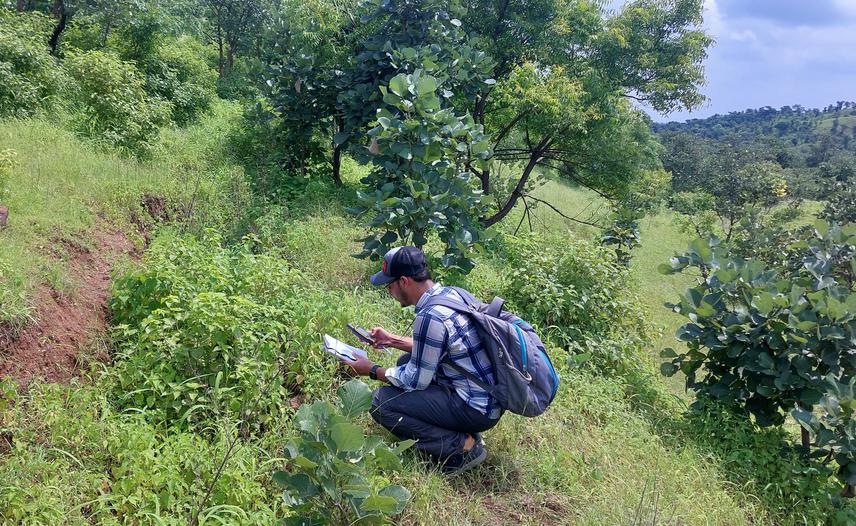Anirban Roy
The Indian Forest Rights Act (2006) legally recognized the forest-dependent community as primary users of forested lands through CFR (Community Forest Resources) titles, promoting CFR-facilitated restoration across the nation. However, there are data paucities on how much restoration is achieved and post-restoration state(s). The extent of biodiversity in restored CFR parcels, market forces influence, decision-making coherence with scientific backing, and long-term ecological ramifications of actions need investigation followed by disseminating findings to relevant stakeholders.

Collecting vegetation and location data from a CFR-restored parcel. © Karthik Reddy.
Therefore, I intend to assess the 'ecological and social appropriateness' of forest restoration in five CFR villages of Vidarbha region, India. The novelty of this proposed project is that it is focused on studying restoration efforts of historically degraded forests through ecological aspects and social (and market) drivers led by forest-dependent communities.
The project is designed to be conducted in spatially large, yet contested common landscape, unnotified under the India State of Forest Reports (ISFRs), or revenue or agricultural land(s). The findings will be baseline ecological data for these largely neglected landscapes and also provide insights regarding the social dimensions associated with these lands for relevant stakeholders.
The discourse of restoration ecology has changed over time and now there is overwhelming evidence that not all so-called restoration initiatives are 'restoration' in practice. Such ostensible restoration perspectives can influence people to engage in practices that are unconducive to the well- being of the very lands that they intend to restore. Therefore, modifications on-the-ground would require mindset changes, and that in itself seeks awareness. Through the proposed project and subsequent outreach events, my aim is to bring attitudinal shifts that will lead to sustainable restoration initiatives benefitting both humans and the ecosystems that they belong to.
When it comes to forest restoration, understanding trade-offs between scientific and social aspects is key to maximizing its impacts. Socio ecologically appropriate restoration has the potential to mitigate climate change in the long run and concomitantly enhance livelihood security as a climate-change adaptation measure for forest-dependent people. That being said, the project outcomes will inform the CFR villagers about strategies for forest restoration and its governance in the right direction to achieve a sustainable normative. The project will aim to go beyond just analysis of the ‘appropriateness’ of restoration practices and offer solutions for improvement in the longer term.
Header: CFR-restored parcel in Payvihir village (restoration began in 2010) in Amravati district, Maharashtra-India. © Anirban Roy.